Assessment 2: Research Project Proposal - Airbnb and UK Lodging
VerifiedAdded on 2023/06/08
|11
|2802
|430
Report
AI Summary
This research project proposal examines the impact of the COVID-19 pandemic on the UK lodging industry, with a specific focus on Airbnb. The introduction outlines the background, research rationale, aims, and objectives, highlighting challenges such as booking cancellations, low occupancy, and operational difficulties. The literature review explores these challenges in detail, assessing the impact on Airbnb's business performance, including reduced productivity and changing market conditions. It also investigates strategies adopted by Airbnb, such as using social media, implementing digital locks, and employee training. The methodology section details the research philosophy, approach, strategy, choice, and data collection methods, including the use of surveys and both primary and secondary data. The project aims to identify the pandemic's effect on the UK lodging industry, with specific objectives to examine challenges, determine the impact on Airbnb's performance, and analyze adopted strategies. The proposal concludes with resource requirements and an action plan, outlining the timeline and costs associated with the research.
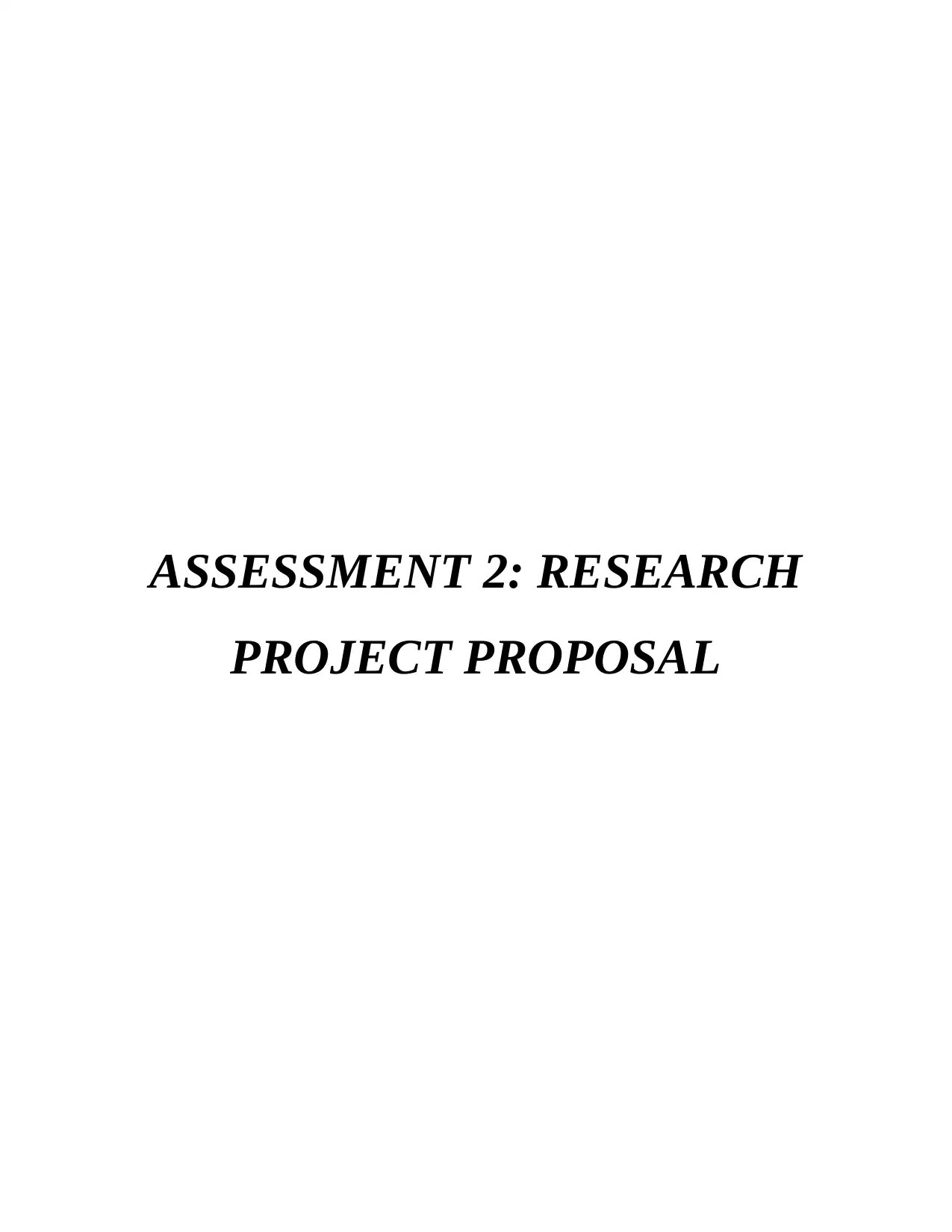
ASSESSMENT 2: RESEARCH
PROJECT PROPOSAL
PROJECT PROPOSAL
Paraphrase This Document
Need a fresh take? Get an instant paraphrase of this document with our AI Paraphraser
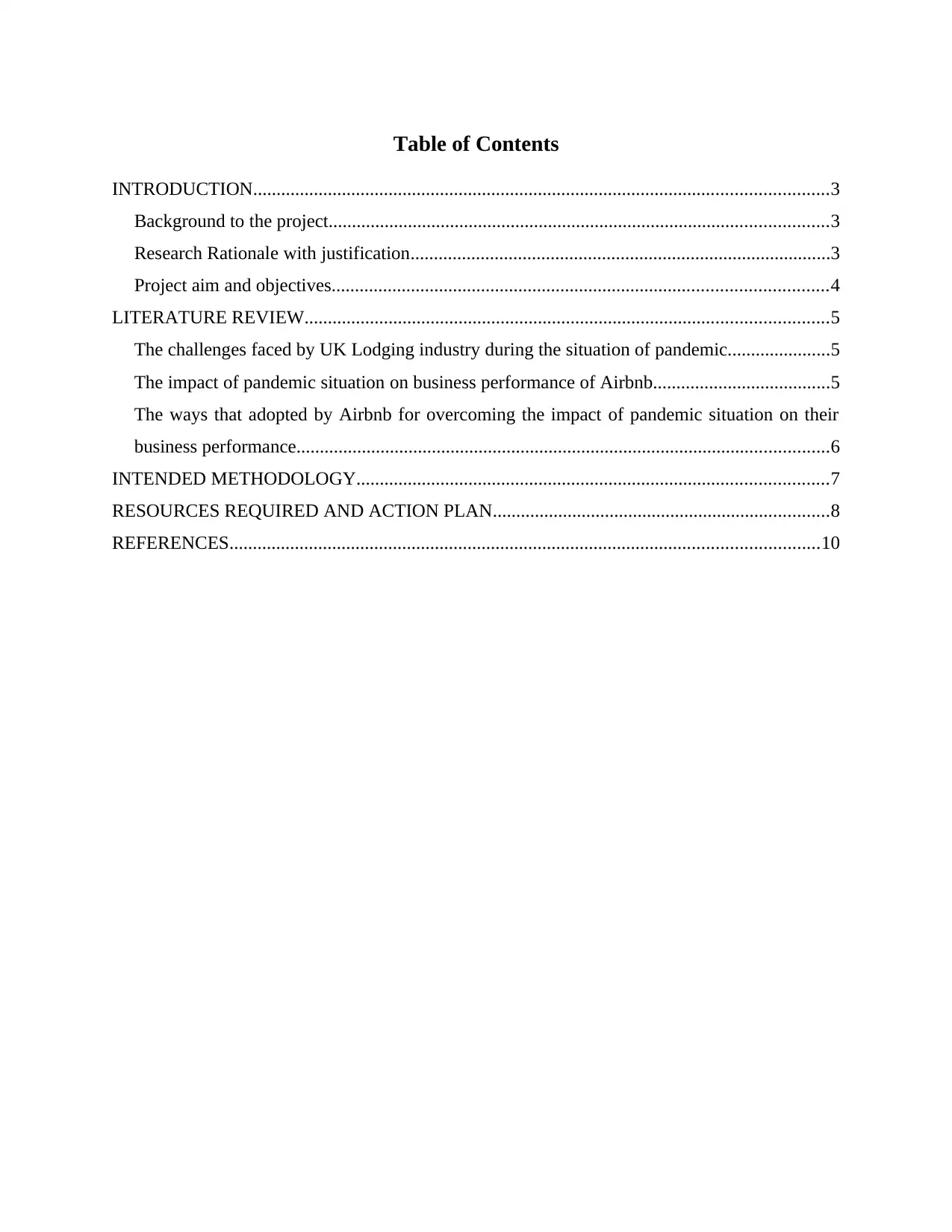
Table of Contents
INTRODUCTION...........................................................................................................................3
Background to the project...........................................................................................................3
Research Rationale with justification..........................................................................................3
Project aim and objectives..........................................................................................................4
LITERATURE REVIEW................................................................................................................5
The challenges faced by UK Lodging industry during the situation of pandemic......................5
The impact of pandemic situation on business performance of Airbnb......................................5
The ways that adopted by Airbnb for overcoming the impact of pandemic situation on their
business performance..................................................................................................................6
INTENDED METHODOLOGY.....................................................................................................7
RESOURCES REQUIRED AND ACTION PLAN........................................................................8
REFERENCES..............................................................................................................................10
INTRODUCTION...........................................................................................................................3
Background to the project...........................................................................................................3
Research Rationale with justification..........................................................................................3
Project aim and objectives..........................................................................................................4
LITERATURE REVIEW................................................................................................................5
The challenges faced by UK Lodging industry during the situation of pandemic......................5
The impact of pandemic situation on business performance of Airbnb......................................5
The ways that adopted by Airbnb for overcoming the impact of pandemic situation on their
business performance..................................................................................................................6
INTENDED METHODOLOGY.....................................................................................................7
RESOURCES REQUIRED AND ACTION PLAN........................................................................8
REFERENCES..............................................................................................................................10
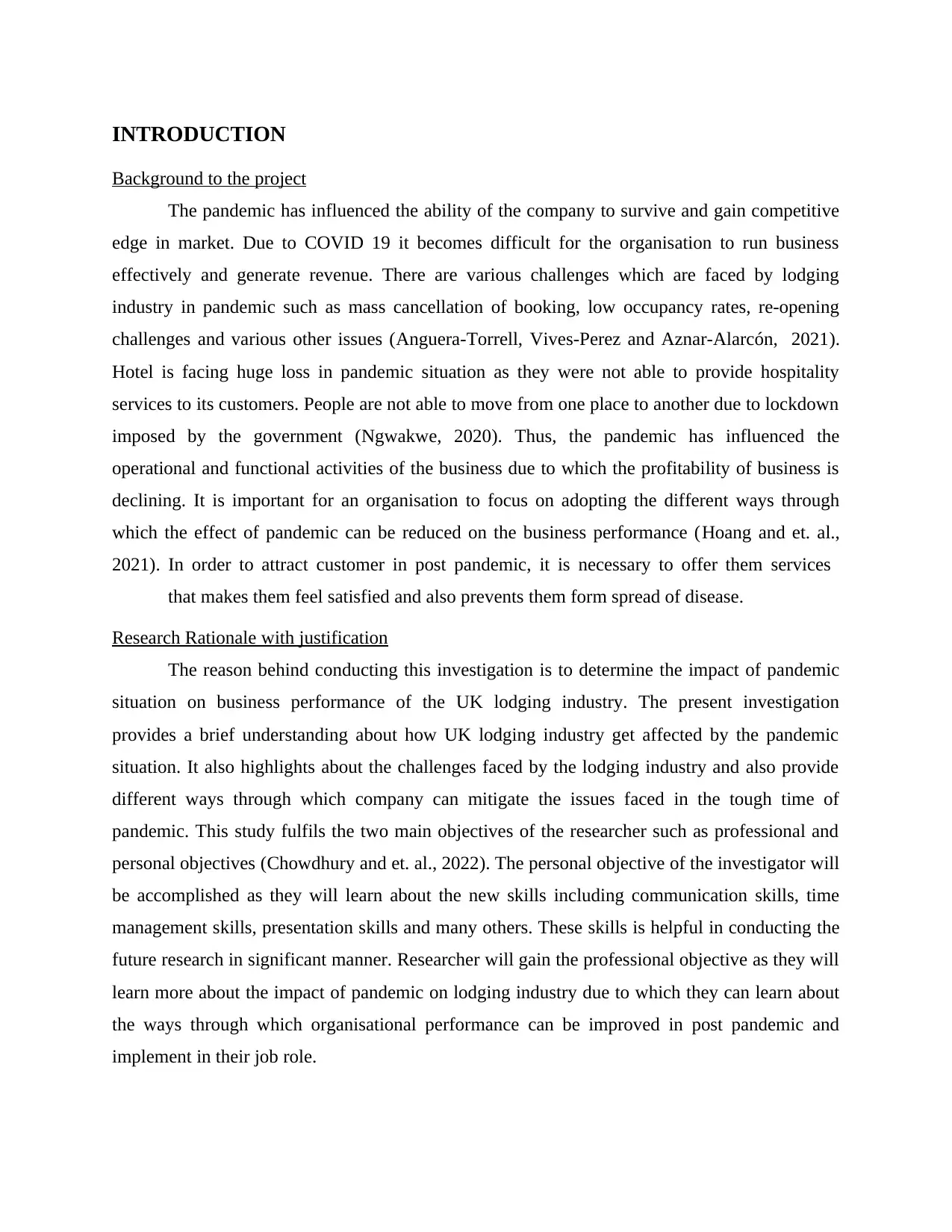
INTRODUCTION
Background to the project
The pandemic has influenced the ability of the company to survive and gain competitive
edge in market. Due to COVID 19 it becomes difficult for the organisation to run business
effectively and generate revenue. There are various challenges which are faced by lodging
industry in pandemic such as mass cancellation of booking, low occupancy rates, re-opening
challenges and various other issues (Anguera-Torrell, Vives-Perez and Aznar-Alarcón, 2021).
Hotel is facing huge loss in pandemic situation as they were not able to provide hospitality
services to its customers. People are not able to move from one place to another due to lockdown
imposed by the government (Ngwakwe, 2020). Thus, the pandemic has influenced the
operational and functional activities of the business due to which the profitability of business is
declining. It is important for an organisation to focus on adopting the different ways through
which the effect of pandemic can be reduced on the business performance (Hoang and et. al.,
2021). In order to attract customer in post pandemic, it is necessary to offer them services
that makes them feel satisfied and also prevents them form spread of disease.
Research Rationale with justification
The reason behind conducting this investigation is to determine the impact of pandemic
situation on business performance of the UK lodging industry. The present investigation
provides a brief understanding about how UK lodging industry get affected by the pandemic
situation. It also highlights about the challenges faced by the lodging industry and also provide
different ways through which company can mitigate the issues faced in the tough time of
pandemic. This study fulfils the two main objectives of the researcher such as professional and
personal objectives (Chowdhury and et. al., 2022). The personal objective of the investigator will
be accomplished as they will learn about the new skills including communication skills, time
management skills, presentation skills and many others. These skills is helpful in conducting the
future research in significant manner. Researcher will gain the professional objective as they will
learn more about the impact of pandemic on lodging industry due to which they can learn about
the ways through which organisational performance can be improved in post pandemic and
implement in their job role.
Background to the project
The pandemic has influenced the ability of the company to survive and gain competitive
edge in market. Due to COVID 19 it becomes difficult for the organisation to run business
effectively and generate revenue. There are various challenges which are faced by lodging
industry in pandemic such as mass cancellation of booking, low occupancy rates, re-opening
challenges and various other issues (Anguera-Torrell, Vives-Perez and Aznar-Alarcón, 2021).
Hotel is facing huge loss in pandemic situation as they were not able to provide hospitality
services to its customers. People are not able to move from one place to another due to lockdown
imposed by the government (Ngwakwe, 2020). Thus, the pandemic has influenced the
operational and functional activities of the business due to which the profitability of business is
declining. It is important for an organisation to focus on adopting the different ways through
which the effect of pandemic can be reduced on the business performance (Hoang and et. al.,
2021). In order to attract customer in post pandemic, it is necessary to offer them services
that makes them feel satisfied and also prevents them form spread of disease.
Research Rationale with justification
The reason behind conducting this investigation is to determine the impact of pandemic
situation on business performance of the UK lodging industry. The present investigation
provides a brief understanding about how UK lodging industry get affected by the pandemic
situation. It also highlights about the challenges faced by the lodging industry and also provide
different ways through which company can mitigate the issues faced in the tough time of
pandemic. This study fulfils the two main objectives of the researcher such as professional and
personal objectives (Chowdhury and et. al., 2022). The personal objective of the investigator will
be accomplished as they will learn about the new skills including communication skills, time
management skills, presentation skills and many others. These skills is helpful in conducting the
future research in significant manner. Researcher will gain the professional objective as they will
learn more about the impact of pandemic on lodging industry due to which they can learn about
the ways through which organisational performance can be improved in post pandemic and
implement in their job role.
⊘ This is a preview!⊘
Do you want full access?
Subscribe today to unlock all pages.

Trusted by 1+ million students worldwide
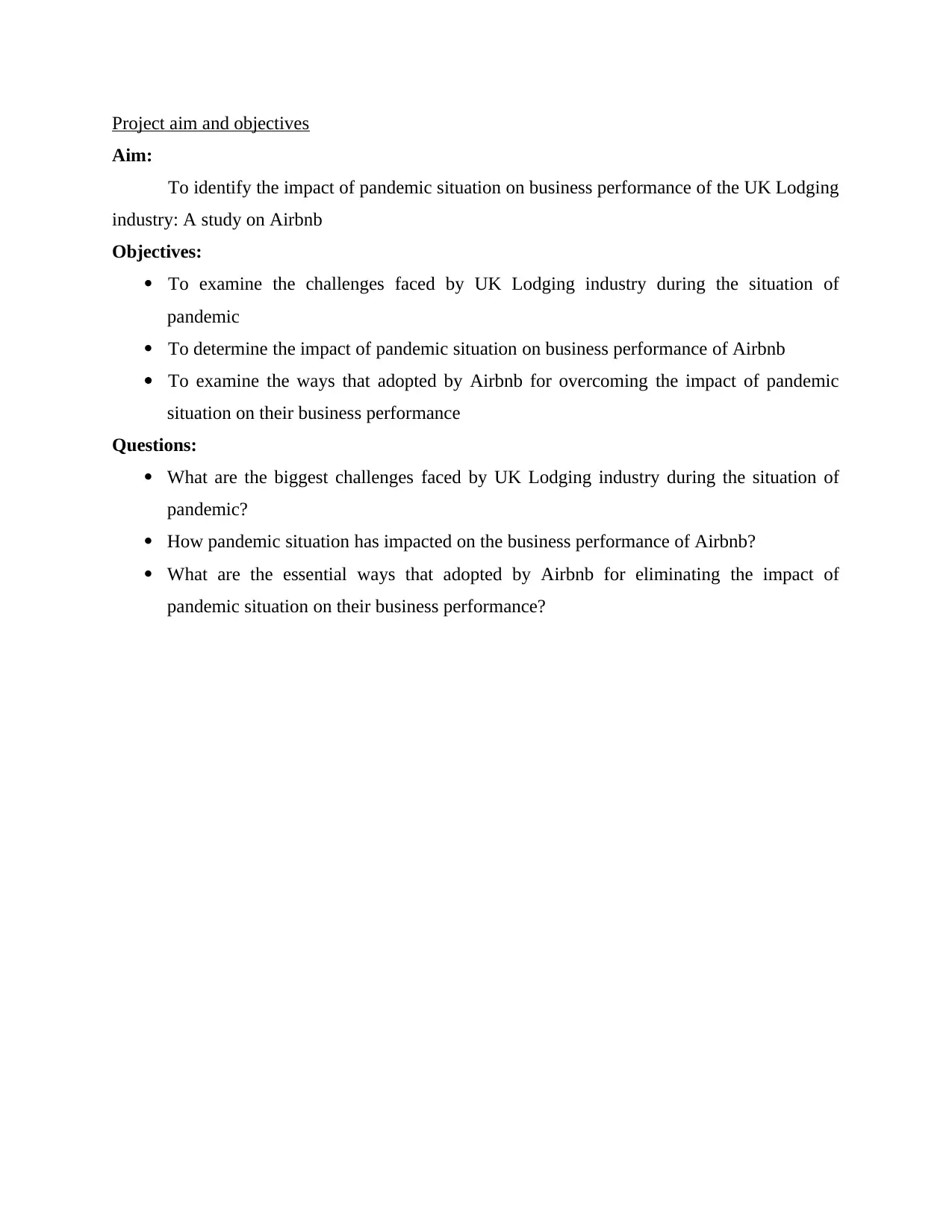
Project aim and objectives
Aim:
To identify the impact of pandemic situation on business performance of the UK Lodging
industry: A study on Airbnb
Objectives:
To examine the challenges faced by UK Lodging industry during the situation of
pandemic
To determine the impact of pandemic situation on business performance of Airbnb
To examine the ways that adopted by Airbnb for overcoming the impact of pandemic
situation on their business performance
Questions:
What are the biggest challenges faced by UK Lodging industry during the situation of
pandemic?
How pandemic situation has impacted on the business performance of Airbnb?
What are the essential ways that adopted by Airbnb for eliminating the impact of
pandemic situation on their business performance?
Aim:
To identify the impact of pandemic situation on business performance of the UK Lodging
industry: A study on Airbnb
Objectives:
To examine the challenges faced by UK Lodging industry during the situation of
pandemic
To determine the impact of pandemic situation on business performance of Airbnb
To examine the ways that adopted by Airbnb for overcoming the impact of pandemic
situation on their business performance
Questions:
What are the biggest challenges faced by UK Lodging industry during the situation of
pandemic?
How pandemic situation has impacted on the business performance of Airbnb?
What are the essential ways that adopted by Airbnb for eliminating the impact of
pandemic situation on their business performance?
Paraphrase This Document
Need a fresh take? Get an instant paraphrase of this document with our AI Paraphraser
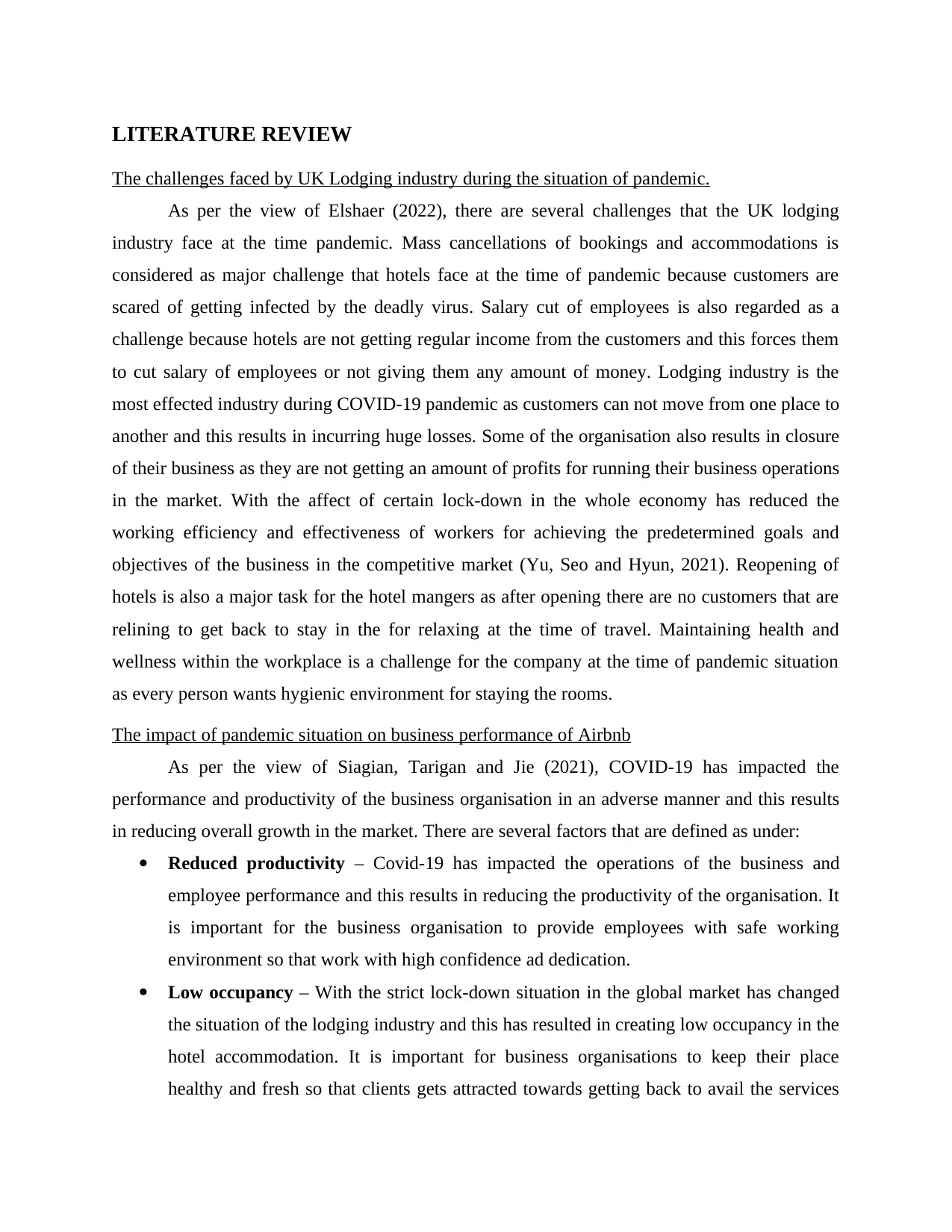
LITERATURE REVIEW
The challenges faced by UK Lodging industry during the situation of pandemic.
As per the view of Elshaer (2022), there are several challenges that the UK lodging
industry face at the time pandemic. Mass cancellations of bookings and accommodations is
considered as major challenge that hotels face at the time of pandemic because customers are
scared of getting infected by the deadly virus. Salary cut of employees is also regarded as a
challenge because hotels are not getting regular income from the customers and this forces them
to cut salary of employees or not giving them any amount of money. Lodging industry is the
most effected industry during COVID-19 pandemic as customers can not move from one place to
another and this results in incurring huge losses. Some of the organisation also results in closure
of their business as they are not getting an amount of profits for running their business operations
in the market. With the affect of certain lock-down in the whole economy has reduced the
working efficiency and effectiveness of workers for achieving the predetermined goals and
objectives of the business in the competitive market (Yu, Seo and Hyun, 2021). Reopening of
hotels is also a major task for the hotel mangers as after opening there are no customers that are
relining to get back to stay in the for relaxing at the time of travel. Maintaining health and
wellness within the workplace is a challenge for the company at the time of pandemic situation
as every person wants hygienic environment for staying the rooms.
The impact of pandemic situation on business performance of Airbnb
As per the view of Siagian, Tarigan and Jie (2021), COVID-19 has impacted the
performance and productivity of the business organisation in an adverse manner and this results
in reducing overall growth in the market. There are several factors that are defined as under:
Reduced productivity – Covid-19 has impacted the operations of the business and
employee performance and this results in reducing the productivity of the organisation. It
is important for the business organisation to provide employees with safe working
environment so that work with high confidence ad dedication.
Low occupancy – With the strict lock-down situation in the global market has changed
the situation of the lodging industry and this has resulted in creating low occupancy in the
hotel accommodation. It is important for business organisations to keep their place
healthy and fresh so that clients gets attracted towards getting back to avail the services
The challenges faced by UK Lodging industry during the situation of pandemic.
As per the view of Elshaer (2022), there are several challenges that the UK lodging
industry face at the time pandemic. Mass cancellations of bookings and accommodations is
considered as major challenge that hotels face at the time of pandemic because customers are
scared of getting infected by the deadly virus. Salary cut of employees is also regarded as a
challenge because hotels are not getting regular income from the customers and this forces them
to cut salary of employees or not giving them any amount of money. Lodging industry is the
most effected industry during COVID-19 pandemic as customers can not move from one place to
another and this results in incurring huge losses. Some of the organisation also results in closure
of their business as they are not getting an amount of profits for running their business operations
in the market. With the affect of certain lock-down in the whole economy has reduced the
working efficiency and effectiveness of workers for achieving the predetermined goals and
objectives of the business in the competitive market (Yu, Seo and Hyun, 2021). Reopening of
hotels is also a major task for the hotel mangers as after opening there are no customers that are
relining to get back to stay in the for relaxing at the time of travel. Maintaining health and
wellness within the workplace is a challenge for the company at the time of pandemic situation
as every person wants hygienic environment for staying the rooms.
The impact of pandemic situation on business performance of Airbnb
As per the view of Siagian, Tarigan and Jie (2021), COVID-19 has impacted the
performance and productivity of the business organisation in an adverse manner and this results
in reducing overall growth in the market. There are several factors that are defined as under:
Reduced productivity – Covid-19 has impacted the operations of the business and
employee performance and this results in reducing the productivity of the organisation. It
is important for the business organisation to provide employees with safe working
environment so that work with high confidence ad dedication.
Low occupancy – With the strict lock-down situation in the global market has changed
the situation of the lodging industry and this has resulted in creating low occupancy in the
hotel accommodation. It is important for business organisations to keep their place
healthy and fresh so that clients gets attracted towards getting back to avail the services
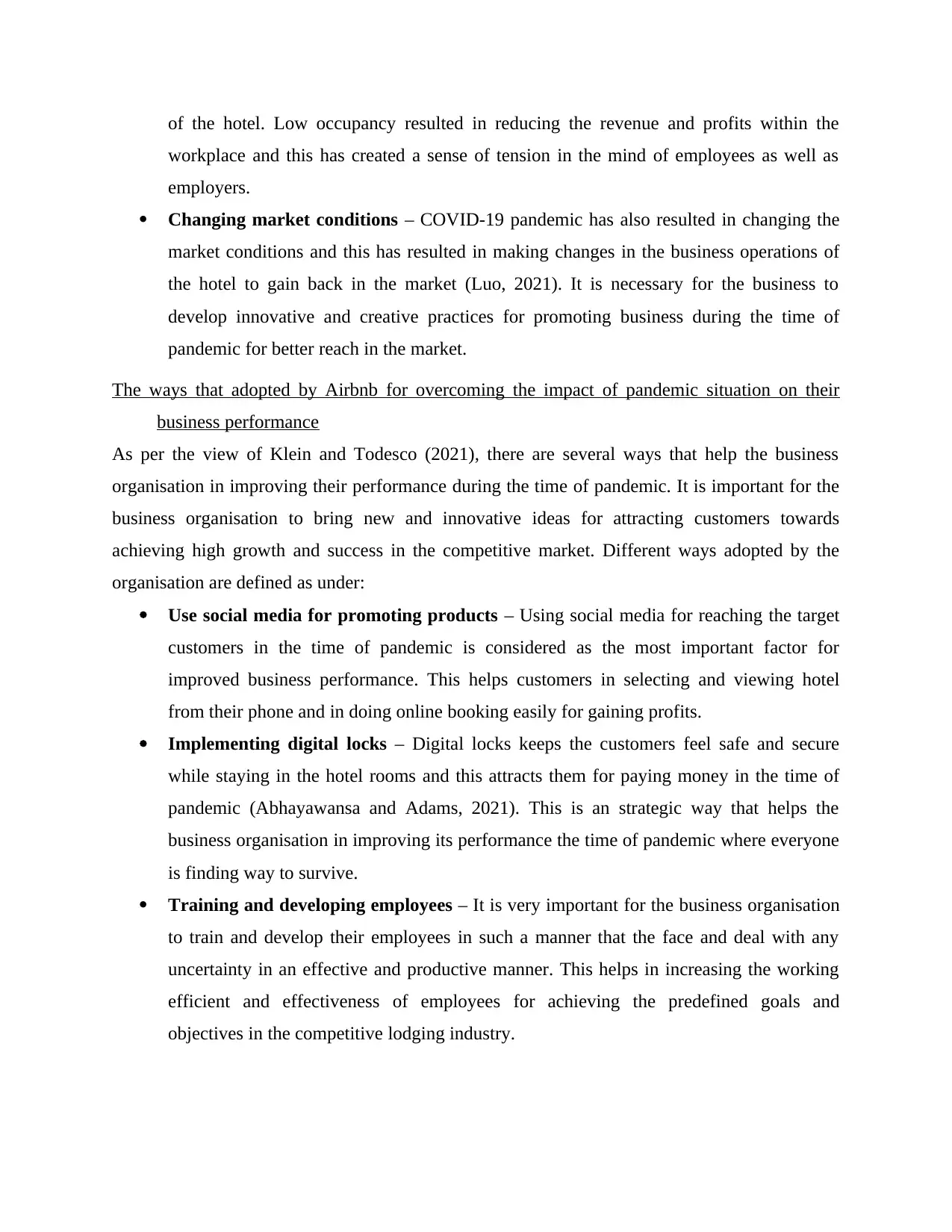
of the hotel. Low occupancy resulted in reducing the revenue and profits within the
workplace and this has created a sense of tension in the mind of employees as well as
employers.
Changing market conditions – COVID-19 pandemic has also resulted in changing the
market conditions and this has resulted in making changes in the business operations of
the hotel to gain back in the market (Luo, 2021). It is necessary for the business to
develop innovative and creative practices for promoting business during the time of
pandemic for better reach in the market.
The ways that adopted by Airbnb for overcoming the impact of pandemic situation on their
business performance
As per the view of Klein and Todesco (2021), there are several ways that help the business
organisation in improving their performance during the time of pandemic. It is important for the
business organisation to bring new and innovative ideas for attracting customers towards
achieving high growth and success in the competitive market. Different ways adopted by the
organisation are defined as under:
Use social media for promoting products – Using social media for reaching the target
customers in the time of pandemic is considered as the most important factor for
improved business performance. This helps customers in selecting and viewing hotel
from their phone and in doing online booking easily for gaining profits.
Implementing digital locks – Digital locks keeps the customers feel safe and secure
while staying in the hotel rooms and this attracts them for paying money in the time of
pandemic (Abhayawansa and Adams, 2021). This is an strategic way that helps the
business organisation in improving its performance the time of pandemic where everyone
is finding way to survive.
Training and developing employees – It is very important for the business organisation
to train and develop their employees in such a manner that the face and deal with any
uncertainty in an effective and productive manner. This helps in increasing the working
efficient and effectiveness of employees for achieving the predefined goals and
objectives in the competitive lodging industry.
workplace and this has created a sense of tension in the mind of employees as well as
employers.
Changing market conditions – COVID-19 pandemic has also resulted in changing the
market conditions and this has resulted in making changes in the business operations of
the hotel to gain back in the market (Luo, 2021). It is necessary for the business to
develop innovative and creative practices for promoting business during the time of
pandemic for better reach in the market.
The ways that adopted by Airbnb for overcoming the impact of pandemic situation on their
business performance
As per the view of Klein and Todesco (2021), there are several ways that help the business
organisation in improving their performance during the time of pandemic. It is important for the
business organisation to bring new and innovative ideas for attracting customers towards
achieving high growth and success in the competitive market. Different ways adopted by the
organisation are defined as under:
Use social media for promoting products – Using social media for reaching the target
customers in the time of pandemic is considered as the most important factor for
improved business performance. This helps customers in selecting and viewing hotel
from their phone and in doing online booking easily for gaining profits.
Implementing digital locks – Digital locks keeps the customers feel safe and secure
while staying in the hotel rooms and this attracts them for paying money in the time of
pandemic (Abhayawansa and Adams, 2021). This is an strategic way that helps the
business organisation in improving its performance the time of pandemic where everyone
is finding way to survive.
Training and developing employees – It is very important for the business organisation
to train and develop their employees in such a manner that the face and deal with any
uncertainty in an effective and productive manner. This helps in increasing the working
efficient and effectiveness of employees for achieving the predefined goals and
objectives in the competitive lodging industry.
⊘ This is a preview!⊘
Do you want full access?
Subscribe today to unlock all pages.

Trusted by 1+ million students worldwide
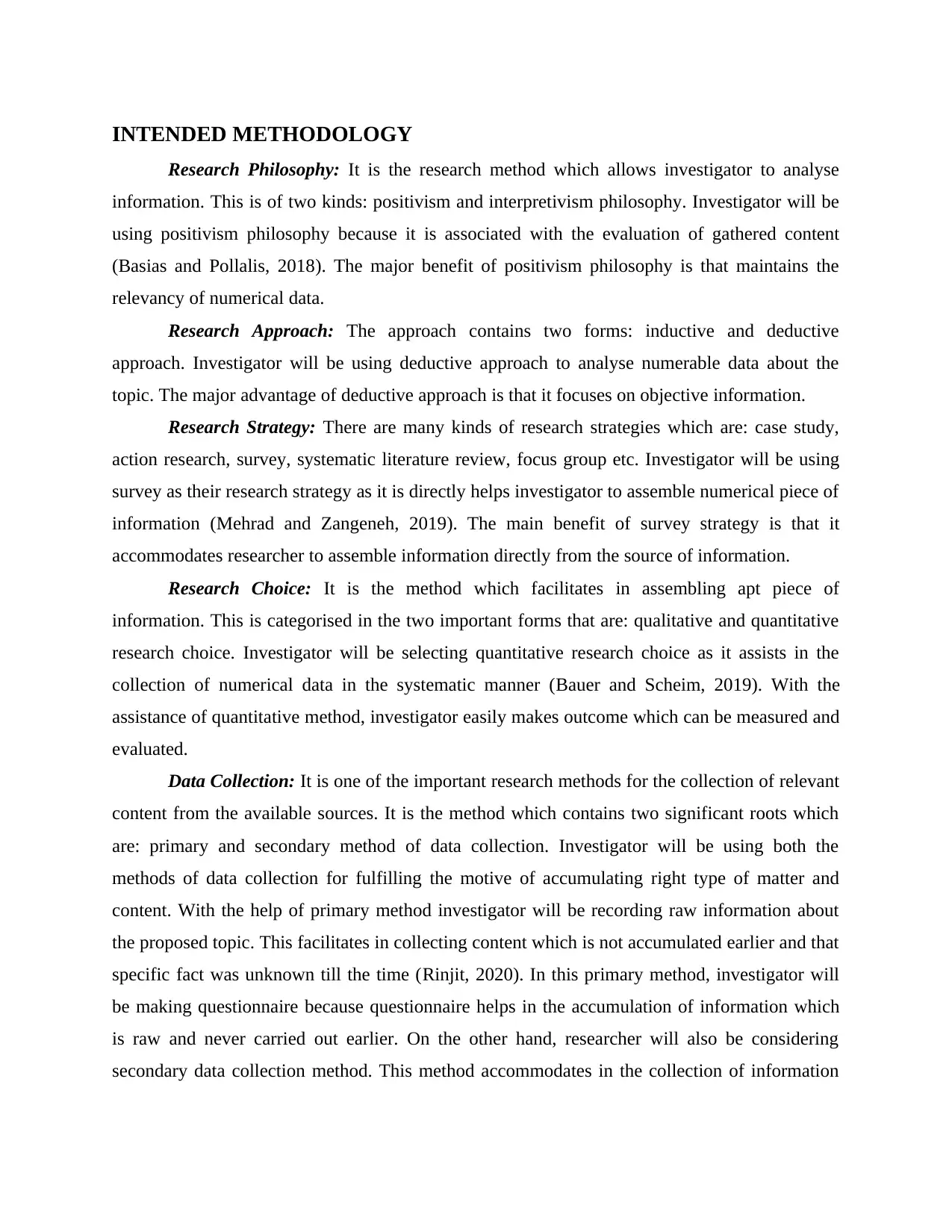
INTENDED METHODOLOGY
Research Philosophy: It is the research method which allows investigator to analyse
information. This is of two kinds: positivism and interpretivism philosophy. Investigator will be
using positivism philosophy because it is associated with the evaluation of gathered content
(Basias and Pollalis, 2018). The major benefit of positivism philosophy is that maintains the
relevancy of numerical data.
Research Approach: The approach contains two forms: inductive and deductive
approach. Investigator will be using deductive approach to analyse numerable data about the
topic. The major advantage of deductive approach is that it focuses on objective information.
Research Strategy: There are many kinds of research strategies which are: case study,
action research, survey, systematic literature review, focus group etc. Investigator will be using
survey as their research strategy as it is directly helps investigator to assemble numerical piece of
information (Mehrad and Zangeneh, 2019). The main benefit of survey strategy is that it
accommodates researcher to assemble information directly from the source of information.
Research Choice: It is the method which facilitates in assembling apt piece of
information. This is categorised in the two important forms that are: qualitative and quantitative
research choice. Investigator will be selecting quantitative research choice as it assists in the
collection of numerical data in the systematic manner (Bauer and Scheim, 2019). With the
assistance of quantitative method, investigator easily makes outcome which can be measured and
evaluated.
Data Collection: It is one of the important research methods for the collection of relevant
content from the available sources. It is the method which contains two significant roots which
are: primary and secondary method of data collection. Investigator will be using both the
methods of data collection for fulfilling the motive of accumulating right type of matter and
content. With the help of primary method investigator will be recording raw information about
the proposed topic. This facilitates in collecting content which is not accumulated earlier and that
specific fact was unknown till the time (Rinjit, 2020). In this primary method, investigator will
be making questionnaire because questionnaire helps in the accumulation of information which
is raw and never carried out earlier. On the other hand, researcher will also be considering
secondary data collection method. This method accommodates in the collection of information
Research Philosophy: It is the research method which allows investigator to analyse
information. This is of two kinds: positivism and interpretivism philosophy. Investigator will be
using positivism philosophy because it is associated with the evaluation of gathered content
(Basias and Pollalis, 2018). The major benefit of positivism philosophy is that maintains the
relevancy of numerical data.
Research Approach: The approach contains two forms: inductive and deductive
approach. Investigator will be using deductive approach to analyse numerable data about the
topic. The major advantage of deductive approach is that it focuses on objective information.
Research Strategy: There are many kinds of research strategies which are: case study,
action research, survey, systematic literature review, focus group etc. Investigator will be using
survey as their research strategy as it is directly helps investigator to assemble numerical piece of
information (Mehrad and Zangeneh, 2019). The main benefit of survey strategy is that it
accommodates researcher to assemble information directly from the source of information.
Research Choice: It is the method which facilitates in assembling apt piece of
information. This is categorised in the two important forms that are: qualitative and quantitative
research choice. Investigator will be selecting quantitative research choice as it assists in the
collection of numerical data in the systematic manner (Bauer and Scheim, 2019). With the
assistance of quantitative method, investigator easily makes outcome which can be measured and
evaluated.
Data Collection: It is one of the important research methods for the collection of relevant
content from the available sources. It is the method which contains two significant roots which
are: primary and secondary method of data collection. Investigator will be using both the
methods of data collection for fulfilling the motive of accumulating right type of matter and
content. With the help of primary method investigator will be recording raw information about
the proposed topic. This facilitates in collecting content which is not accumulated earlier and that
specific fact was unknown till the time (Rinjit, 2020). In this primary method, investigator will
be making questionnaire because questionnaire helps in the accumulation of information which
is raw and never carried out earlier. On the other hand, researcher will also be considering
secondary data collection method. This method accommodates in the collection of information
Paraphrase This Document
Need a fresh take? Get an instant paraphrase of this document with our AI Paraphraser
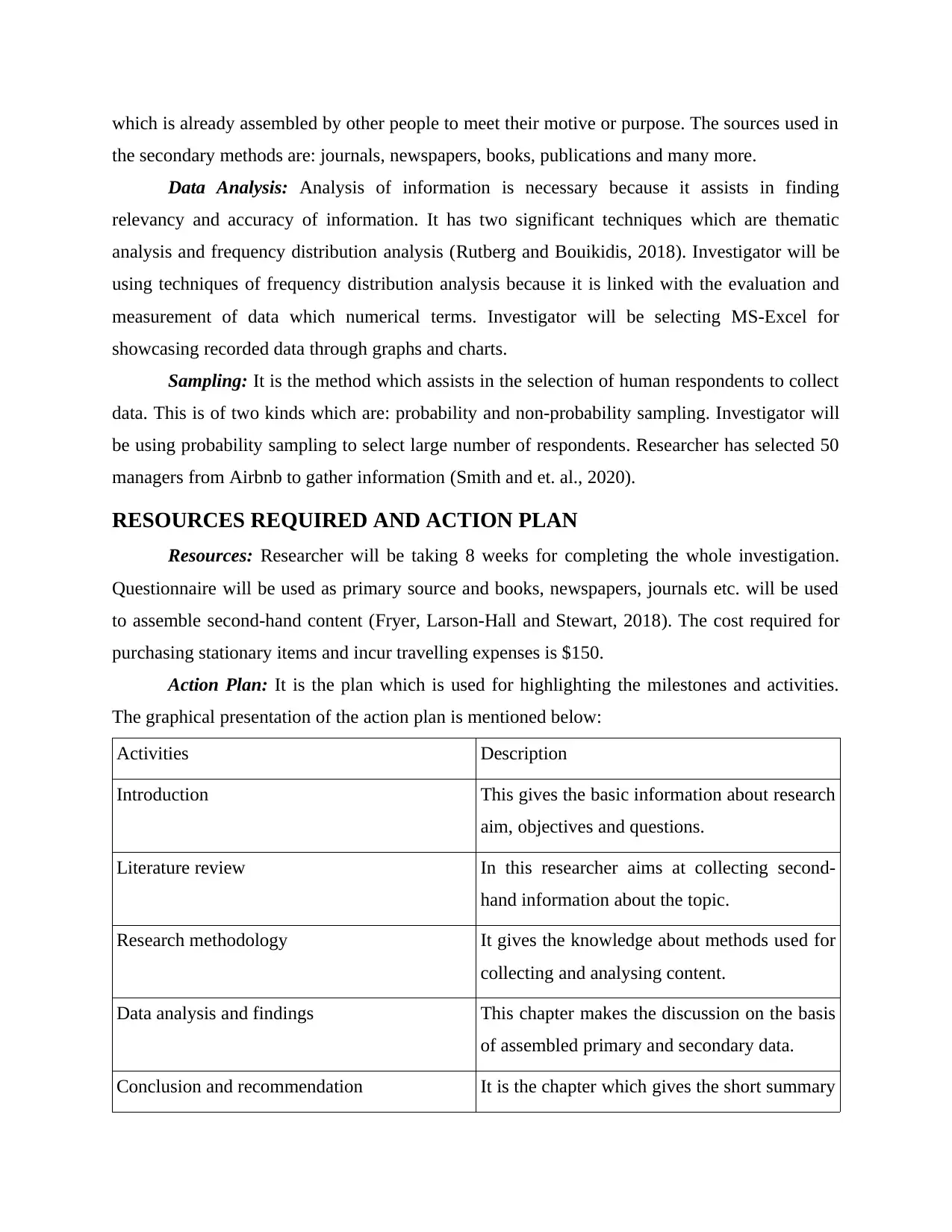
which is already assembled by other people to meet their motive or purpose. The sources used in
the secondary methods are: journals, newspapers, books, publications and many more.
Data Analysis: Analysis of information is necessary because it assists in finding
relevancy and accuracy of information. It has two significant techniques which are thematic
analysis and frequency distribution analysis (Rutberg and Bouikidis, 2018). Investigator will be
using techniques of frequency distribution analysis because it is linked with the evaluation and
measurement of data which numerical terms. Investigator will be selecting MS-Excel for
showcasing recorded data through graphs and charts.
Sampling: It is the method which assists in the selection of human respondents to collect
data. This is of two kinds which are: probability and non-probability sampling. Investigator will
be using probability sampling to select large number of respondents. Researcher has selected 50
managers from Airbnb to gather information (Smith and et. al., 2020).
RESOURCES REQUIRED AND ACTION PLAN
Resources: Researcher will be taking 8 weeks for completing the whole investigation.
Questionnaire will be used as primary source and books, newspapers, journals etc. will be used
to assemble second-hand content (Fryer, Larson-Hall and Stewart, 2018). The cost required for
purchasing stationary items and incur travelling expenses is $150.
Action Plan: It is the plan which is used for highlighting the milestones and activities.
The graphical presentation of the action plan is mentioned below:
Activities Description
Introduction This gives the basic information about research
aim, objectives and questions.
Literature review In this researcher aims at collecting second-
hand information about the topic.
Research methodology It gives the knowledge about methods used for
collecting and analysing content.
Data analysis and findings This chapter makes the discussion on the basis
of assembled primary and secondary data.
Conclusion and recommendation It is the chapter which gives the short summary
the secondary methods are: journals, newspapers, books, publications and many more.
Data Analysis: Analysis of information is necessary because it assists in finding
relevancy and accuracy of information. It has two significant techniques which are thematic
analysis and frequency distribution analysis (Rutberg and Bouikidis, 2018). Investigator will be
using techniques of frequency distribution analysis because it is linked with the evaluation and
measurement of data which numerical terms. Investigator will be selecting MS-Excel for
showcasing recorded data through graphs and charts.
Sampling: It is the method which assists in the selection of human respondents to collect
data. This is of two kinds which are: probability and non-probability sampling. Investigator will
be using probability sampling to select large number of respondents. Researcher has selected 50
managers from Airbnb to gather information (Smith and et. al., 2020).
RESOURCES REQUIRED AND ACTION PLAN
Resources: Researcher will be taking 8 weeks for completing the whole investigation.
Questionnaire will be used as primary source and books, newspapers, journals etc. will be used
to assemble second-hand content (Fryer, Larson-Hall and Stewart, 2018). The cost required for
purchasing stationary items and incur travelling expenses is $150.
Action Plan: It is the plan which is used for highlighting the milestones and activities.
The graphical presentation of the action plan is mentioned below:
Activities Description
Introduction This gives the basic information about research
aim, objectives and questions.
Literature review In this researcher aims at collecting second-
hand information about the topic.
Research methodology It gives the knowledge about methods used for
collecting and analysing content.
Data analysis and findings This chapter makes the discussion on the basis
of assembled primary and secondary data.
Conclusion and recommendation It is the chapter which gives the short summary
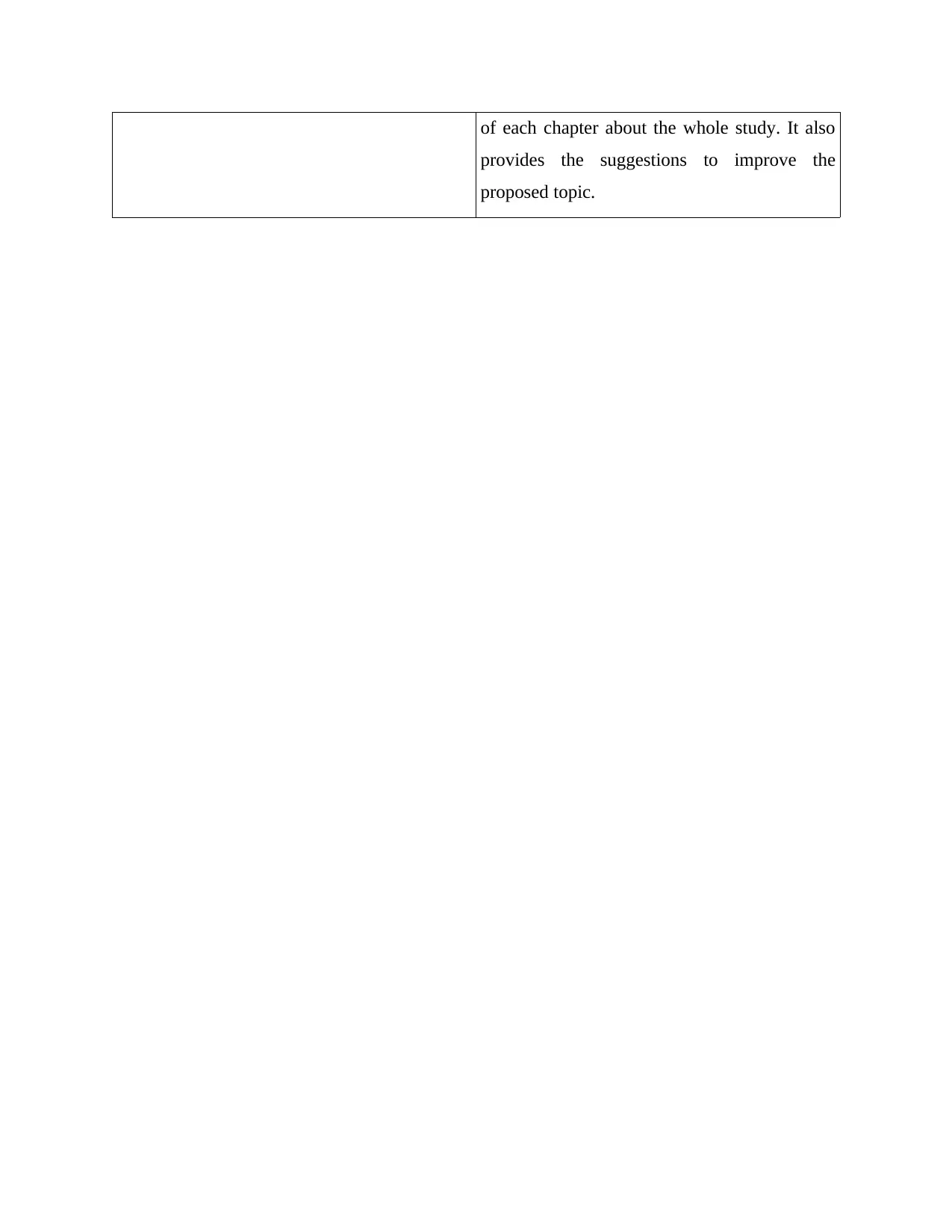
of each chapter about the whole study. It also
provides the suggestions to improve the
proposed topic.
provides the suggestions to improve the
proposed topic.
⊘ This is a preview!⊘
Do you want full access?
Subscribe today to unlock all pages.

Trusted by 1+ million students worldwide
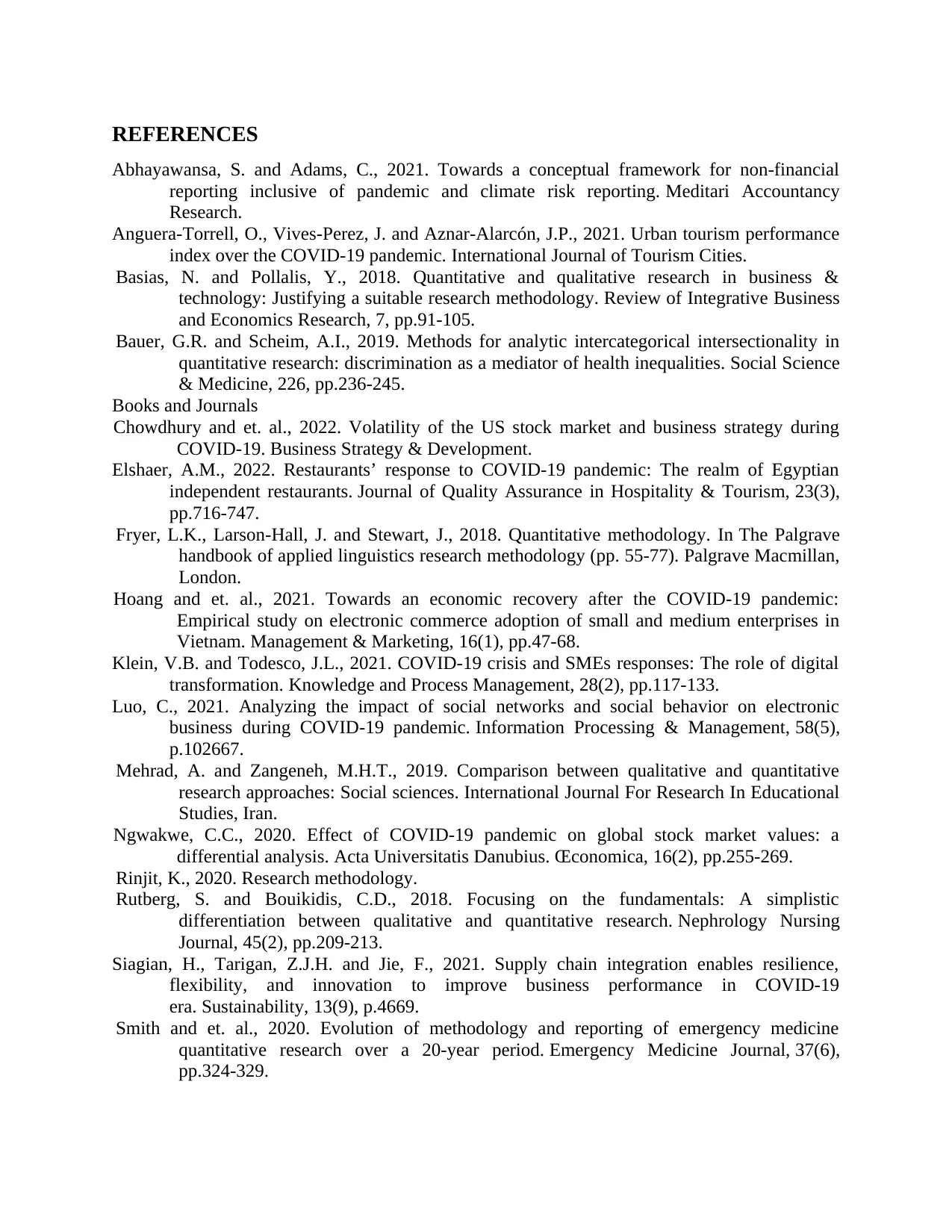
REFERENCES
Abhayawansa, S. and Adams, C., 2021. Towards a conceptual framework for non-financial
reporting inclusive of pandemic and climate risk reporting. Meditari Accountancy
Research.
Anguera-Torrell, O., Vives-Perez, J. and Aznar-Alarcón, J.P., 2021. Urban tourism performance
index over the COVID-19 pandemic. International Journal of Tourism Cities.
Basias, N. and Pollalis, Y., 2018. Quantitative and qualitative research in business &
technology: Justifying a suitable research methodology. Review of Integrative Business
and Economics Research, 7, pp.91-105.
Bauer, G.R. and Scheim, A.I., 2019. Methods for analytic intercategorical intersectionality in
quantitative research: discrimination as a mediator of health inequalities. Social Science
& Medicine, 226, pp.236-245.
Books and Journals
Chowdhury and et. al., 2022. Volatility of the US stock market and business strategy during
COVID‐19. Business Strategy & Development.
Elshaer, A.M., 2022. Restaurants’ response to COVID-19 pandemic: The realm of Egyptian
independent restaurants. Journal of Quality Assurance in Hospitality & Tourism, 23(3),
pp.716-747.
Fryer, L.K., Larson-Hall, J. and Stewart, J., 2018. Quantitative methodology. In The Palgrave
handbook of applied linguistics research methodology (pp. 55-77). Palgrave Macmillan,
London.
Hoang and et. al., 2021. Towards an economic recovery after the COVID-19 pandemic:
Empirical study on electronic commerce adoption of small and medium enterprises in
Vietnam. Management & Marketing, 16(1), pp.47-68.
Klein, V.B. and Todesco, J.L., 2021. COVID‐19 crisis and SMEs responses: The role of digital
transformation. Knowledge and Process Management, 28(2), pp.117-133.
Luo, C., 2021. Analyzing the impact of social networks and social behavior on electronic
business during COVID-19 pandemic. Information Processing & Management, 58(5),
p.102667.
Mehrad, A. and Zangeneh, M.H.T., 2019. Comparison between qualitative and quantitative
research approaches: Social sciences. International Journal For Research In Educational
Studies, Iran.
Ngwakwe, C.C., 2020. Effect of COVID-19 pandemic on global stock market values: a
differential analysis. Acta Universitatis Danubius. Œconomica, 16(2), pp.255-269.
Rinjit, K., 2020. Research methodology.
Rutberg, S. and Bouikidis, C.D., 2018. Focusing on the fundamentals: A simplistic
differentiation between qualitative and quantitative research. Nephrology Nursing
Journal, 45(2), pp.209-213.
Siagian, H., Tarigan, Z.J.H. and Jie, F., 2021. Supply chain integration enables resilience,
flexibility, and innovation to improve business performance in COVID-19
era. Sustainability, 13(9), p.4669.
Smith and et. al., 2020. Evolution of methodology and reporting of emergency medicine
quantitative research over a 20-year period. Emergency Medicine Journal, 37(6),
pp.324-329.
Abhayawansa, S. and Adams, C., 2021. Towards a conceptual framework for non-financial
reporting inclusive of pandemic and climate risk reporting. Meditari Accountancy
Research.
Anguera-Torrell, O., Vives-Perez, J. and Aznar-Alarcón, J.P., 2021. Urban tourism performance
index over the COVID-19 pandemic. International Journal of Tourism Cities.
Basias, N. and Pollalis, Y., 2018. Quantitative and qualitative research in business &
technology: Justifying a suitable research methodology. Review of Integrative Business
and Economics Research, 7, pp.91-105.
Bauer, G.R. and Scheim, A.I., 2019. Methods for analytic intercategorical intersectionality in
quantitative research: discrimination as a mediator of health inequalities. Social Science
& Medicine, 226, pp.236-245.
Books and Journals
Chowdhury and et. al., 2022. Volatility of the US stock market and business strategy during
COVID‐19. Business Strategy & Development.
Elshaer, A.M., 2022. Restaurants’ response to COVID-19 pandemic: The realm of Egyptian
independent restaurants. Journal of Quality Assurance in Hospitality & Tourism, 23(3),
pp.716-747.
Fryer, L.K., Larson-Hall, J. and Stewart, J., 2018. Quantitative methodology. In The Palgrave
handbook of applied linguistics research methodology (pp. 55-77). Palgrave Macmillan,
London.
Hoang and et. al., 2021. Towards an economic recovery after the COVID-19 pandemic:
Empirical study on electronic commerce adoption of small and medium enterprises in
Vietnam. Management & Marketing, 16(1), pp.47-68.
Klein, V.B. and Todesco, J.L., 2021. COVID‐19 crisis and SMEs responses: The role of digital
transformation. Knowledge and Process Management, 28(2), pp.117-133.
Luo, C., 2021. Analyzing the impact of social networks and social behavior on electronic
business during COVID-19 pandemic. Information Processing & Management, 58(5),
p.102667.
Mehrad, A. and Zangeneh, M.H.T., 2019. Comparison between qualitative and quantitative
research approaches: Social sciences. International Journal For Research In Educational
Studies, Iran.
Ngwakwe, C.C., 2020. Effect of COVID-19 pandemic on global stock market values: a
differential analysis. Acta Universitatis Danubius. Œconomica, 16(2), pp.255-269.
Rinjit, K., 2020. Research methodology.
Rutberg, S. and Bouikidis, C.D., 2018. Focusing on the fundamentals: A simplistic
differentiation between qualitative and quantitative research. Nephrology Nursing
Journal, 45(2), pp.209-213.
Siagian, H., Tarigan, Z.J.H. and Jie, F., 2021. Supply chain integration enables resilience,
flexibility, and innovation to improve business performance in COVID-19
era. Sustainability, 13(9), p.4669.
Smith and et. al., 2020. Evolution of methodology and reporting of emergency medicine
quantitative research over a 20-year period. Emergency Medicine Journal, 37(6),
pp.324-329.
Paraphrase This Document
Need a fresh take? Get an instant paraphrase of this document with our AI Paraphraser
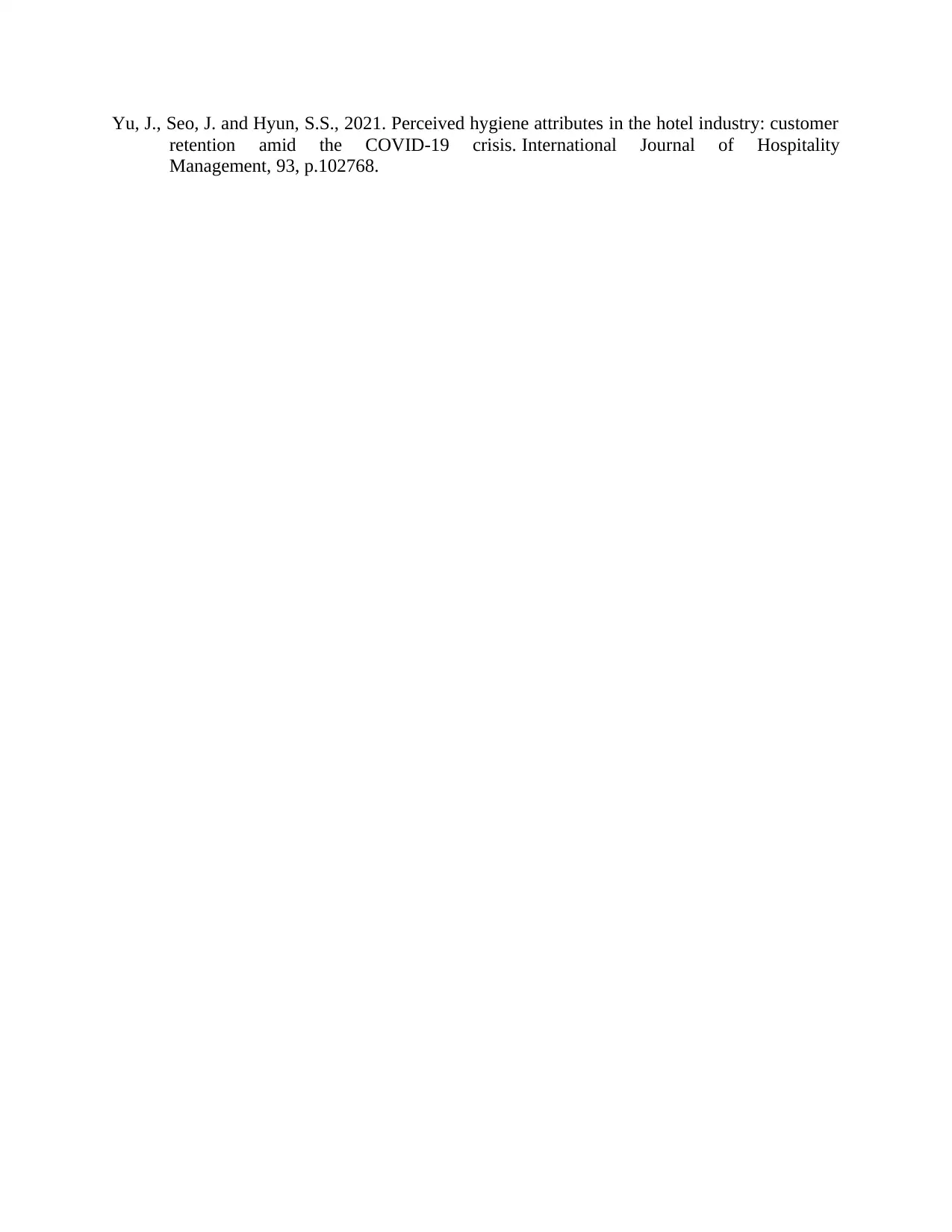
Yu, J., Seo, J. and Hyun, S.S., 2021. Perceived hygiene attributes in the hotel industry: customer
retention amid the COVID-19 crisis. International Journal of Hospitality
Management, 93, p.102768.
retention amid the COVID-19 crisis. International Journal of Hospitality
Management, 93, p.102768.
1 out of 11
Related Documents
Your All-in-One AI-Powered Toolkit for Academic Success.
+13062052269
info@desklib.com
Available 24*7 on WhatsApp / Email
![[object Object]](/_next/static/media/star-bottom.7253800d.svg)
Unlock your academic potential
Copyright © 2020–2026 A2Z Services. All Rights Reserved. Developed and managed by ZUCOL.



